I. Introduction
Search engine spam refers to the unethical practice of manipulating search engine rankings by using deceptive and misleading techniques. It involves using tactics that violate search engine guidelines and attempt to artificially increase website traffic and rankings. This article will explore the different types of search engine spam. It will also study the consequences of engaging in such activities. Finally it will offer techniques for avoiding search engine spam.
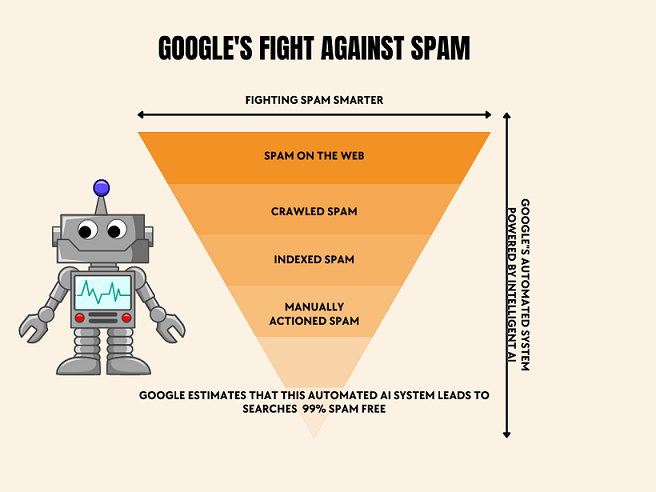
A. Definition of search engine spam
Search engine spam can be defined as any tactic used to manipulate search engine rankings in a way that violates search engine guidelines. It involves using tactics such as keyword stuffing, cloaking, link spamming, and other deceptive practices to artificially increase website traffic and rankings. Search engine spam is considered unethical and can result in penalties from search engines.
In 2020 alone, Google’s systems claim to discover 40 billion spammy pages per day.
B. Importance of search engine spam in online marketing
Search engine spam can have a significant impact on online marketing. By artificially increasing website rankings, businesses can gain a competitive advantage over their competitors. However, this advantage is short-lived and can result in penalties from search engines. Penalties lead to a loss of traffic and potential customers. In addition, search engine spam can damage a company’s reputation and brand image. The damage reputation will make it more difficult to attract customers in the long run.
C. Brief history of search engine spam
Search engine spam has been around since the early days of search engines. In the early 2000s, search engine rankings were heavily influenced by the number of links pointing to a website. This led to the creation of link farms, which were networks of websites that linked to each other to artificially inflate rankings. As search engines became more sophisticated, they began to crack down on these tactics, and search engine spam evolved to include new techniques such as cloaking and keyword stuffing.
In conclusion, search engine spam is an unethical practice that can result in penalties from search engines, damage to reputation and brand image, and a loss of traffic and potential customers. By focusing on creating high-quality, original content and using ethical SEO techniques, businesses can avoid engaging in search engine spam and ensure long-term success in online marketing. The leading players in the Search Engine Market are serious about the unethical practices people follow to manipulate them.
II. Types of Search Engine Spam
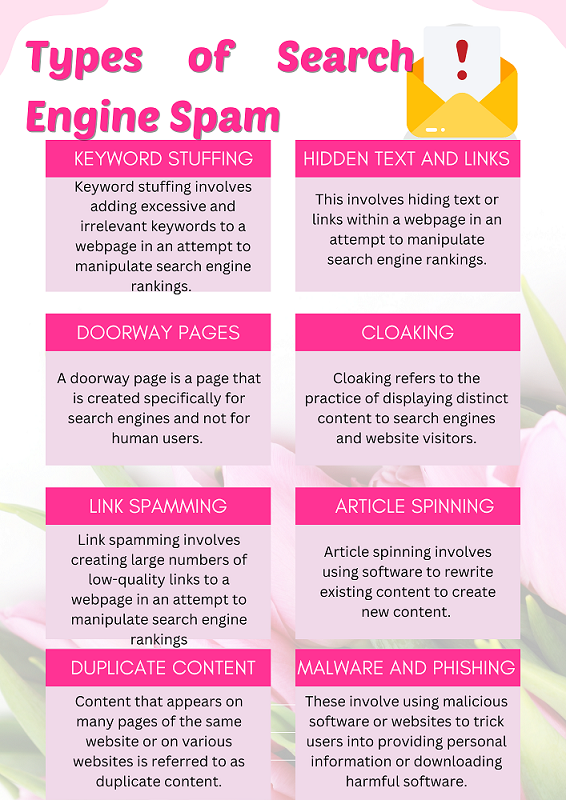
Search engine spam can take many forms, with each tactic designed to manipulate search engine rankings in some way. Here are some of the most familiar types of search engine spam:
A. Keyword stuffing
Keyword stuffing involves adding excessive and irrelevant keywords to a webpage in an attempt to manipulate search engine rankings. This strategy can lead to a poor user experience, as the content is generally difficult to comprehend and lacks value.
B. Hidden text and links
This involves hiding text or links within a webpage in an attempt to manipulate search engine rankings. For instance, the text may be white on a white backdrop so that visitors cannot see it but search engine crawlers can still read it.
C. Doorway pages
A doorway page is a page that is created specifically for search engines and not for human users. These pages are typically optimized for specific keywords and are designed to rank well in search engine results pages (SERPs). The user is taken to another page on the website when they click the link, which is frequently of little or no value.
D. Cloaking
Cloaking refers to the practice of displaying distinct content to search engines and website visitors. The process usually involves identifying the user’s browser agent and displaying different content depending on whether the request is being made by a search engine crawler or a human user. This tactic is considered unethical and can result in penalties from search engines.
E. Link spamming
Link spamming involves creating large numbers of low-quality links to a webpage in an attempt to manipulate search engine rankings. This tactic can include buying links, participating in link exchanges, and creating fake profiles or comments with links back to the website.
F. Article spinning
Article spinning involves using software to rewrite existing content to create new content. This method is frequently employed to quickly and cheaply produce big amounts of content, however it may produce subpar writing and low-quality material that offers little value to readers.
G. Duplicate content
Content that appears on many pages of the same website or on various websites is referred to as duplicate content. This may lead to a bad user experience and penalization by search engines.
H. Malware and phishing
Malware and phishing involve using malicious software or websites to trick users into providing personal information or downloading harmful software. These tactics can lead to a loss of reputation and trust and can result in penalties from search engines.
In conclusion, search engine spam can take many forms, each designed to manipulate search engine rankings and artificially increase website traffic. However, these tactics are considered unethical and can result in penalties from search engines, a loss of traffic and potential customers, and damage to reputation and brand image. By focusing on creating high-quality, original content and using ethical SEO techniques, businesses can avoid engaging in search engine spam and ensure long-term success in online marketing.
III. Consequences of Search Engine Spam
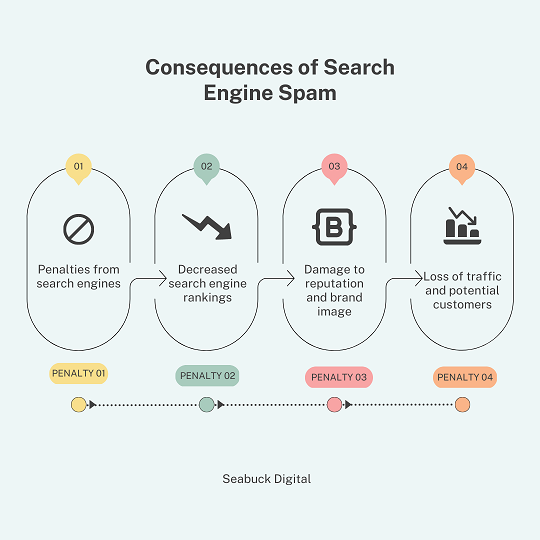
While short-term increases in website traffic and rankings may be provided by search engine spam, it can have negative long-term effects. Here are some of the most common consequences of search engine spam:
A. Penalties from search engines
Sophisticated algorithms have been designed by search engines to identify and penalize websites that employ spammy tactics. Penalties can range from a drop in rankings to removal from search engine results altogether. These penalties can be challenging to overcome and significantly harm a company’s online success and visibility.
Just to give you a clear idea about how Google’s sophisticated algorithm works, Google launched SpamBrain in 2018 to fight against spam. This is what Google’ webspam report of 2021 has to say – SpamBrain’s latest findings reveal a sharp increase in the number of spam sites identified in 2021, which is nearly six times more than the previous year. This has led to a significant decline in the occurrence of hacked spam, a type of spam that was frequently reported in 2020, with a reduction of 70%. Additionally, gibberish spam on hosting platforms has decreased by 75%.
B. Decreased search engine rankings
Search engine spam can result in decreased search engine rankings, making it more difficult for users to find a website through organic search. This can cause a loss of traffic and potential customers.
C. Damage to reputation and brand image
Engaging in search engine spam can damage a business’s reputation and brand image. Users are becoming increasingly savvy about detecting and avoiding spammy websites. A website that appears to be engaging in spammy tactics can be perceived as untrustworthy and unreliable.
D. Loss of traffic and potential customers
Search engine spam can result in a loss of traffic and potential customers. Users who find a website through spammy tactics are likely to have a poor user experience. Due to this poor experience, the user may be less likely to return or recommend the website to others.
In conclusion, the consequences of search engine spam can be severe and long-lasting. Businesses that engage in spammy tactics risk penalties from search engines, decreased search engine rankings, damage to reputation and brand image, and a loss of traffic and potential customers. By focusing on creating high-quality, original content and using ethical SEO techniques, businesses can avoid these consequences and ensure long-term success in online marketing.
IV. Techniques for Avoiding Search Engine Spam
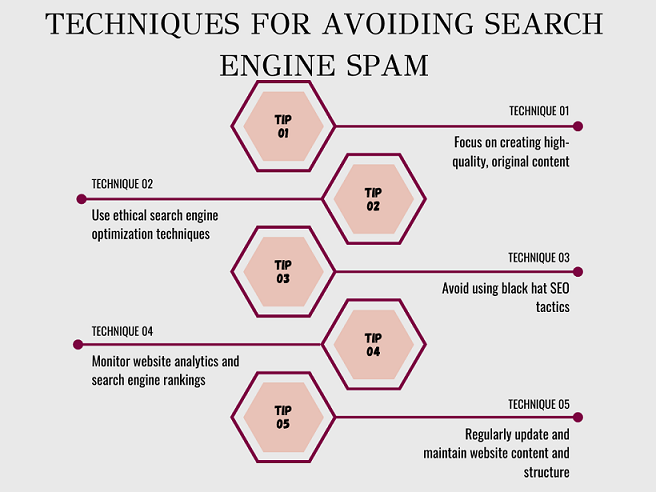
It’s critical to concentrate on producing high-quality, original content and employing ethical SEO tactics in order to prevent the harmful effects of search engine spam. Here are some tips for avoiding search engine spam:
A. Focus on creating high-quality, original content
The best method to avoid search engine spam is to concentrate on producing fresh, high-quality content that offers users value. This entails creating well-researched, educational, and interesting material. By creating content that users find useful and interesting, you can attract natural links and improve your website’s search engine rankings.
B. Use ethical search engine optimization techniques
Ethical search engine optimization (SEO) techniques involve optimizing a website for search engines while also providing value to users. This includes things like optimizing on-page elements, using relevant keywords, and creating high-quality backlinks. You can improve your website’s search engine rankings without engaging in spammy tactics by using ethical SEO techniques.
C. Avoid using black hat SEO tactics
Black hat SEO tactics are techniques that aim to manipulate search engine rankings by violating search engine guidelines. These tactics include keyword stuffing, cloaking, and link spamming. Engaging in black hat SEO tactics can result in penalties from search engines and damage to your website’s reputation and brand image.
D. Monitor website analytics and search engine rankings
Regularly monitoring your website’s analytics and search engine rankings can help you identify potential issues before they become major problems. This can include monitoring your website’s traffic, bounce rates, and conversion rates. Monitoring also includes tracking your website’s search engine rankings for relevant keywords.
E. Regularly update and maintain website content and structure
The user experience and search engine rankings of your website can both be enhanced by routinely updating and maintaining its content and structure. This includes things like regularly publishing new content, updating old content, etc. You must ensure that the layout of your website is simple to use and navigate.
In conclusion, avoiding search engine spam requires a focus on creating high-quality, original content and using ethical SEO techniques. You can improve your website’s search engine rankings and attract more organic traffic by avoiding black hat SEO tactics, monitoring your website’s analytics and search engine rankings, and regularly updating and maintaining your website’s content and structure.
V. Conclusion
Search engine spam can have serious consequences for websites and businesses, including penalties from search engines, decreased search engine rankings, damage to reputation and brand image, and loss of traffic and potential customers. To avoid these consequences, it’s important to focus on creating high-quality, original content and using ethical SEO techniques.
A. Summary of key points
In summary, search engine spam includes various tactics such as keyword stuffing, hidden text and links, doorway pages, cloaking, link spamming, article spinning, duplicate content, and malware and phishing. These tactics aim to manipulate search engine rankings and can lead to penalties and other negative consequences.
B. Importance of ethical SEO practices
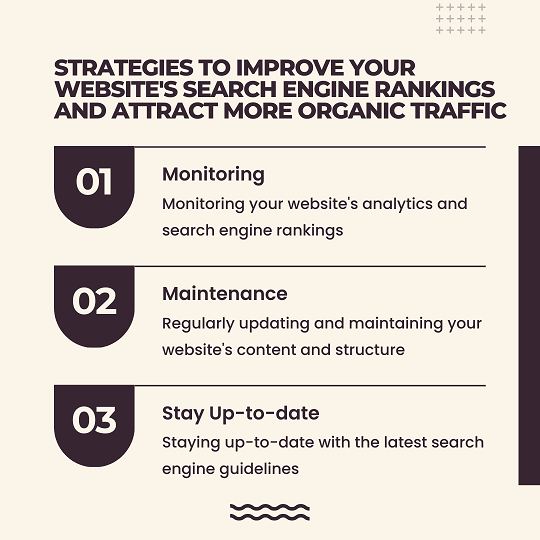
To avoid search engine spam, it’s important to create high-quality, original content, use ethical SEO techniques, and avoid black hat SEO tactics. You can improve your website’s search engine rankings and attract more organic traffic by following the below strategies:
- Monitoring your website’s analytics and search engine rankings
- Regularly updating and maintaining your website’s content and structure
- Staying up-to-date with the latest search engine guidelines
In addition to avoiding search engine spam, it’s also important to prioritize ethical SEO practices. This means focusing on providing value to users and avoiding manipulative tactics. Ethical SEO practices can help improve your website’s search engine rankings while also building a positive reputation and brand image.
C. Final thoughts and recommendations
Search engine spam is a significant problem that may have detrimental effects on websites and companies, to sum up. By focusing on creating high-quality content and using ethical SEO techniques, you can improve your website’s search engine rankings and attract more organic traffic while also avoiding penalties and other negative consequences.
VI. FAQs
What is meant by search engine spamming?
Search engine spamming refers to the practice of using unethical tactics to manipulate search engine rankings in order to gain higher visibility for a website or webpage.
What are examples of search engine spam?
Examples of search engine spam include keyword stuffing, hidden text and links, doorway pages, cloaking, link spamming, article spinning, duplicate content, and malware/phishing.
What is an example of spamdexing?
Spamdexing is a form of search engine spam that involves manipulating the indexing or ranking of a website by creating pages with repetitive or irrelevant content, or by using other deceptive techniques. An example of spamdexing is creating pages with popular search terms or phrases to increase traffic to a website.

